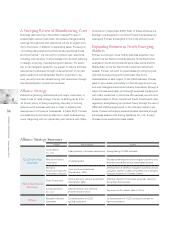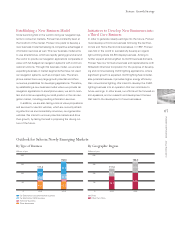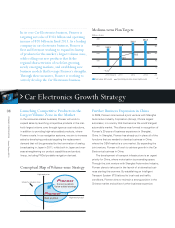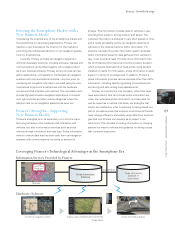Pioneer 2010 Annual Report Download - page 18
Download and view the complete annual report
Please find page 18 of the 2010 Pioneer annual report below. You can navigate through the pages in the report by either clicking on the pages listed below, or by using the keyword search tool below to find specific information within the annual report.
Under the Company Law of Japan, Pioneer has elected to structure its
corporate governance system with a Board of Corporate Auditors. The
Board of Directors, which includes several outside directors, decides on
fundamental issues such as management policies and supervises the
execution of business activities, while the Board of Corporate Auditors
audits the directors’ performance of their duties.
Based on this institutional structure, Pioneer has adopted an executive
officer system to expedite the execution of business activities and clarify the
responsibilities for each business. Meanwhile, aiming to enhance the
transparency of decision making, Pioneer has established a Group Executive
Committee and voluntary advisory committees to the Board of Directors.
Corporate Governance
Board of Directors and Board of
Corporate Auditors
Pioneer has adopted a corporate auditor system of corporate
governance. Under this system, the Company has established
the Board of Directors as a decision-making body for matters
of the highest importance, such as management policies, and
as a supervisory body. The representative directors are respon-
sible for business execution, while the Board of Corporate
Auditors is responsible for auditing. In fiscal 2010, the Board of
Directors held 10 meetings, while the Board of Corporate
Auditors held 16 meetings.
Several outside directors with a high degree of indepen-
dence have been elected to strengthen the supervision of
business execution. In addition, Pioneer has shortened the
term of office of directors to one year. The purpose behind
this action is to further clarify the responsibilities of directors
and facilitate prompt responses to changes in the business
environment by increasing the opportunities for shareholders
to elect directors.
Furthermore, the Company has adopted an executive
officer system to expedite business execution and clarify the
responsibilities for each business.
Group Executive Committee
The Group Executive Committee, which is formed to rein-
force decision making, is comprised of directors and execu-
tive officers chosen by the Board of Directors and holds
regular meetings once per week, in principle. The Group
Executive Committee, under the supervision of the Board of
Directors, thoroughly discusses issues such as priorities for
advancing business activities, investment projects, group
realignment, and group-wide management strategies, as well
as medium- and long-term policies, and approves these
issues, or, in cases where the Board of Directors has
decision-making authority, the Group Executive Committee
reports on these issues to the Board of Directors. In fiscal
2010, the Group Executive Committee held 35 meetings and
deliberated approximately 150 issues, functioning effectively
as part of the management decision-making process in sup-
port of the Board of Directors.
Voluntary Advisory Committees
Pioneer has voluntarily established the following three advi-
sory committees to the Board of Directors, each chaired by
an outside director. Their goals are to improve management
transparency and strengthen corporate governance. These
committees report on the results of their deliberations to the
Board of Directors, and make related recommendations. The
Board of Directors discusses their reports and recommenda-
tions, giving due consideration to their content.
Nominating Committee
This committee discusses matters concerning the election
and dismissal of directors; the election, dismissal, promotion
and demotion of executive officers; and the election of corpo-
rate auditors.
Compensation Committee
This committee discusses issues such as policies and sys-
tems for remuneration and other benefits for directors and
executive officers as well as individual evaluations and com-
pensation levels.
Special Committee
This committee examines and discusses measures to deal
with affairs that have a significant impact on corporate value,
such as mergers and acquisitions, both when they occur, and
when they are likely to occur, from the standpoint of legality,
reasonableness and appropriateness.
PIONEER CORPORATION Annual Report 2010
16
























